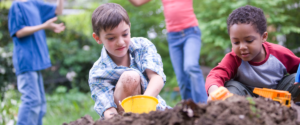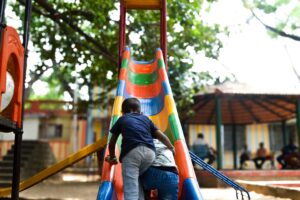
HOW TO BUILD RESILIENCE FOR YOUR CHILD AND FAMILY
By the time you have read this blog, we will be back into the daily routines of school for Term 2. I don’t know about you, but Term 1 seemed to fly past, yet at the same time went so slow! Time seems to go faster as we get older, gain more responsibilities and life/society, in general, becomes busier. Some days there just does not seem to be enough hours to get everything done! And with that, I know that my own ability to cope and my own regulation capacity varies as I try to juggle all that is on the to-do list – both at work and at home.
Over the last few months, I have been engaging in different professional development courses as I am forever learning and striving to do better at my job. While looking at various courses, a theme that seems to be more so present now than ever before is that of positive mental health, mental wellbeing and resilience. A theme that is across all aspects of society, with more awareness and education occurring on multiple levels. Resilience, in particular after the pandemic, seems to be coming more to the forefront. We often read NDIS goals or have parents tell us that they want to develop their child’s resilience.
So what is Resilience?
Resilience is defined as:
- the power or ability of a material to return to its original form, position, etc., after being bent, compressed or stretched;
- the ability of a person to adjust to or recover readily from illness, adversity, major life changes etc;
- the ability of a system or organisation to respond to or recover readily from a crisis, disruptive process etc
(From https://www.dictionary.com/browse/resilience (14th April 2023)
We can definitely see from those definitions why it is such an essential concept at the moment. From an OT perspective, we look at occupational resilience – a person’s ability to successfully participate in their everyday activities while navigating the challenges, changes, stressors and difficulties they face. We develop this resilience when working with your child so that they may overcome whatever hurdle they face at that point in time.
Resilience development occurs through external factors (our environment), internal factors (our values, motivations and beliefs) and learnt factors (social, emotional and interpersonal skills). As OTs, we look at the whole person to consider all of these factors. We look at developing and enhancing your child’s knowledge and skills of emotions and emotional regulation, as their social skills and higher cognitive skills such as problem solving and negotiation. This is only one factor in the overall bigger picture.
Family resilience and how to develop it
Developing Family Resilience is also vital. A key protective factor in mental wellbeing is relationships. We can foster family resilience through occupations (activities) that focus on each person’s strength, allow open and honest emotions and regulation capacities, being present and engaging with each other while contemplating the bigger picture, such as how we can all give back to our wider communities.
In my family unit, one way that we worked on our family resilience was over Easter, we spent time at home enjoying our own space while also resting our minds and bodies. Initially, the kids were not so keen on staying home, but it allowed us as a family to bake, have Mario Kart races, and do a puzzle where everyone contributed to the finished product. Not all of us are good at each of those activities, nor is it our favourite thing to do. There was plenty of frustration, annoyance, and disappointment voiced not only by the children but us as parents too. It allowed us all time to decompress and process the term that was so that we could reconnect, reset and refresh for what is to come. Each family is different, so there is no right fit or right way to do this. It is about finding what works for you and yours.
Resilience Activities & Ideas for you, for your child and for your family
- Gratitude Walks – go on a walk around your neighbourhood, through a park and comment on what you can see and are grateful for.
- Art therapy – spend some time drawing and colouring in with your child to foster connection and communication.
- Community Service – give back to your community in whatever way you can.
- Ask yourself or your child what the hard part is – identify what the challenge is to them so that you can work together to overcome it.
- Look at the Resilience Donut – I have, I can, I am – to identify your strengths.
- Compliments circle – take turns in giving compliments within your family; give a random compliment to a stranger and see their reaction.
- Sharing stories of Resilient People in history whom your family can relate to, eg: JK Rowling, Nelson Mandela.
- Create a dream board – using visualisation of what you believe your family values and goals are. You could do this individually and then come together to work on it.
- The Hard Thing Rules by Angela Duckworth – This combines passion & perseverance, building confidence and grit. There are 3 parts.
- 1. Everyone must do something hard, something that requires practice, something where you are going to get feedback so you can get better at something;
- 2. Must finish what you start eg: season of sport, number of lessons signed up for;
- 3. No one gets to pick the hard thing for anyone else – you must choose your own challenge.
- 1. Everyone must do something hard, something that requires practice, something where you are going to get feedback so you can get better at something;
Additional Resources to read
Check out some of the resources below around resilience for various age groups. Please also chat with your therapist about how else we can support you and your child here at Explore and Soar.
- Smiling Minds – https://www.smilingmind.com.au/resilient-families-program
- Every Mind – https://everymind.org.au/resources/child-illness-and-resilience-program-chirp
- Raising Children Network – https://raisingchildren.net.au/school-age/behaviour/understanding-behaviour/resilience-how-to-build-it-in-children-3-8-years
- Beyond Blue – https://healthyfamilies.beyondblue.org.au/healthy-homes/building-resilience
- The Resilience Project – https://theresilienceproject.com.au/at-home/home-2023/
- Positive Psychology worksheets – https://positivepsychology.com/resilience-activities-worksheets/
Articles
Brown. T (2021). The response to COVID-19: Occupational resilience and the resilience of daily occupations in action. Aust Occup Therapy Journal, 68, pg. 103-105
Masten AS, Barnes AJ (2018). Resilience in Children: Developmental Perspectives. Children 5(98) https://www.ncbi.nlm.nih.gov/pmc/articles/PMC6069421/
Zafran, H (2020). Occupational gifts in the time of a pandemic. Occupational Therapy Now, 22(4),
pg. 5-6. https://caot.ca/uploaded/web/otnow/OT%20Now_JULY_20.pdf#page=7
Until Next time,
Lori
ORIGINALLY PUBLISHED MAY 3, 2023






Leave a Reply